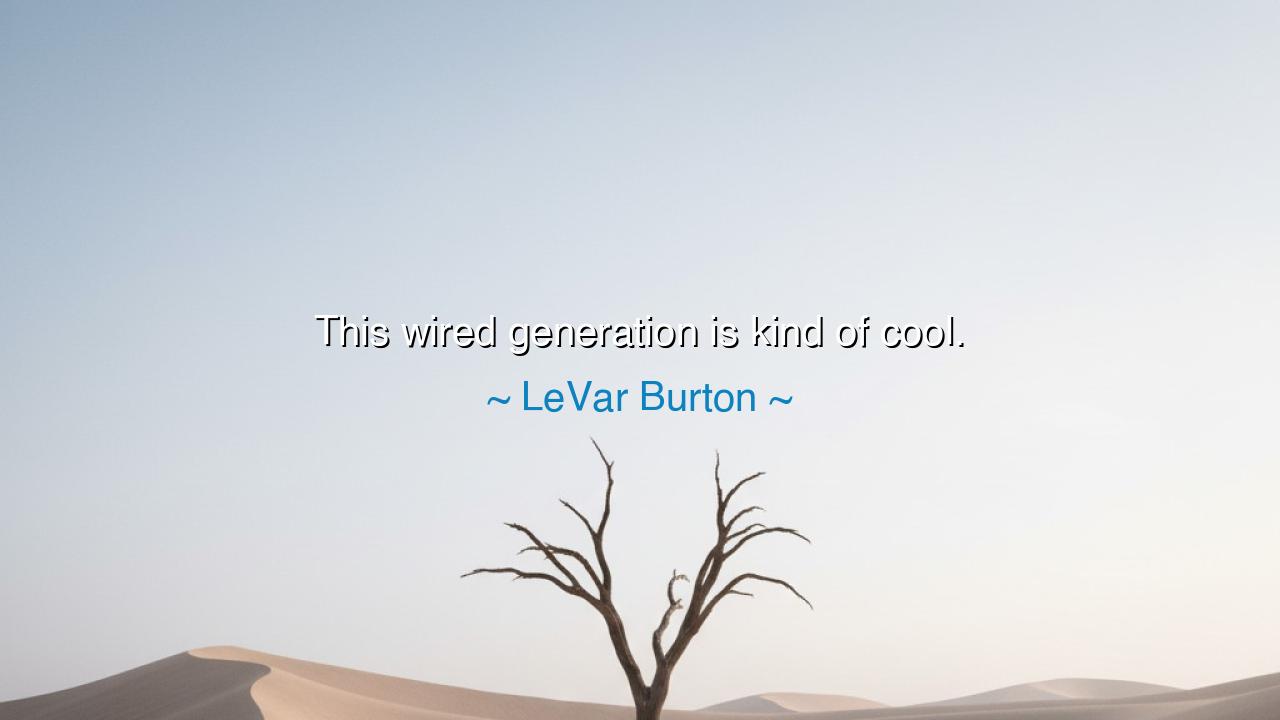
This wired generation is kind of cool.






"This wired generation is kind of cool." These words spoken by LeVar Burton capture the essence of an era defined by connectivity and innovation. The term "wired generation" points to a world where technology has become a part of the fabric of existence, a world where people are not just passively receiving information but actively engaging with it, shaping it, and sharing it in ways unimaginable to those who came before. Burton, known for his role as a champion of education and literacy, recognizes the power of this generation to access knowledge, collaborate, and innovate through the very tools that define our modern age. It is, indeed, a generation that is connected, empowered, and capable of far-reaching change.
In the ancient world, there were those who, like Plato, saw technology as a vehicle for knowledge and understanding. In his Academy, Plato sought not just to pass down wisdom, but to create a space where ideas could be shared and discussed, much as the internet today allows us to share and shape ideas. For Plato, the pursuit of knowledge was not to be isolated to a select few but should be something accessible to anyone willing to seek it. In this sense, the wired generation echoes Plato's vision: we are in an age where knowledge is no longer restricted to the elite, but is available to all, creating opportunities for enlightenment, growth, and transformation on an unprecedented scale.
The rise of the internet and the explosion of social media are modern equivalents to the ancient agora, the gathering place of ideas, where the exchange of wisdom, culture, and news transformed the landscape of society. Just as in ancient Greece, where public discourse was vital for progress, today's wired generation is engaged in global conversations at the speed of light. Marcus Aurelius, the Stoic emperor, believed that knowledge was a tool not just for personal growth, but for the improvement of the world. In this modern age, the internet allows a similar exchange of ideas, where every individual has the potential to influence the collective direction of society, just as those in the ancient agora did.
Consider the story of Leonardo da Vinci, a Renaissance figure whose genius spanned both the arts and sciences. His notebooks, filled with sketches and ideas, were a window into a mind that sought to connect the world around him and innovate across disciplines. Though his work was not "wired" in the sense we understand today, his ability to draw upon the knowledge of multiple fields and share it in ways that transcended his time mirrors the way the wired generation today can connect ideas and foster collaboration globally. Da Vinci’s notebooks, much like modern digital platforms, became a means of sharing knowledge—but where his ideas once waited to be discovered centuries later, the ideas of today’s generation are shared instantly across the world, opening doors to unimaginable possibilities.
The core of Burton’s statement lies in a recognition of the empowering force that the modern digital age offers. Just as the ancients knew that the exchange of ideas was a force that could shape civilization, today’s wired generation holds the potential to reshape the world with their connection to knowledge and each other. The coolness that Burton refers to is not just in the technology itself, but in the way this generation uses it to connect, to challenge old systems, and to create new possibilities for society. The future, as seen through this lens, is one of boundless creativity and unlimited access, where young minds are empowered to dream, build, and transform the world around them.
The lesson to be learned from Burton’s words is not simply to marvel at the coolness of the digital age, but to recognize the responsibility that comes with this power. Knowledge and connection are powerful tools, but they are only useful when applied with purpose, integrity, and a sense of collective responsibility. The wired generation, with all its access and potential, has the power to address global challenges—whether in health, education, or environmental sustainability—if they choose to harness this power wisely. The very tools that allow for the spread of information also enable the spread of understanding and action that can drive positive change in the world.
As we navigate this new era, we must remember that technology is not just a tool for personal advancement but a means of connection that can unite us as a global community. The wired generation must take the lessons of the ancients—where knowledge, collaboration, and the pursuit of truth were central to progress—and apply them with wisdom and courage. Whether through digital platforms, social media, or other modern innovations, we are called to use these tools to connect, learn, and shape the world for the better.
In our own lives, let us embrace the coolness of this era not by simply relying on technology, but by leveraging it to connect, to learn, and to contribute to the collective good. Just as Plato and Da Vinci used their intellect to advance their world, so too must we use our connections and creativity to shape a future where collaboration and knowledge lead us to greater heights. Let us be the generation that uses the wired world to push boundaries, to expand horizons, and to create a legacy of innovation and compassion for all.






AAdministratorAdministrator
Welcome, honored guests. Please leave a comment, we will respond soon